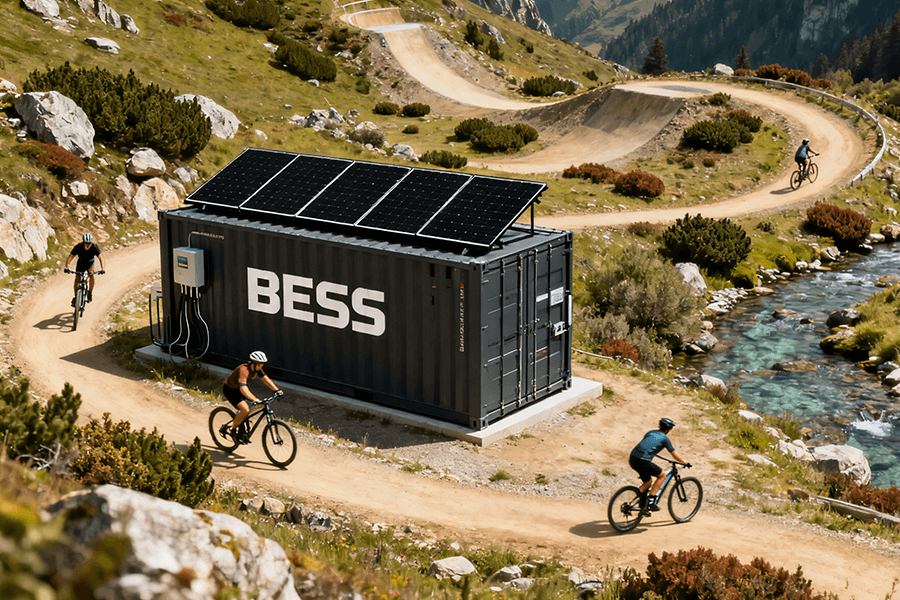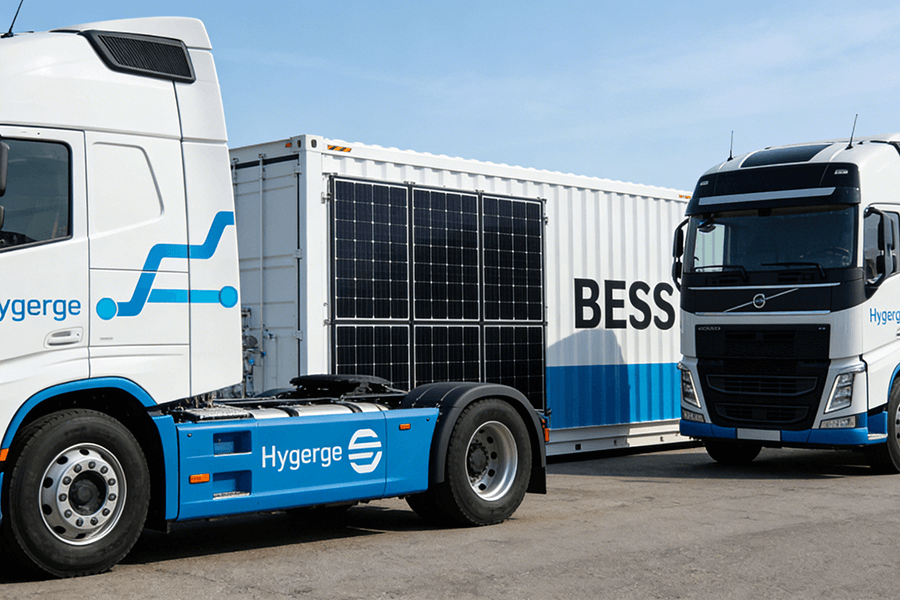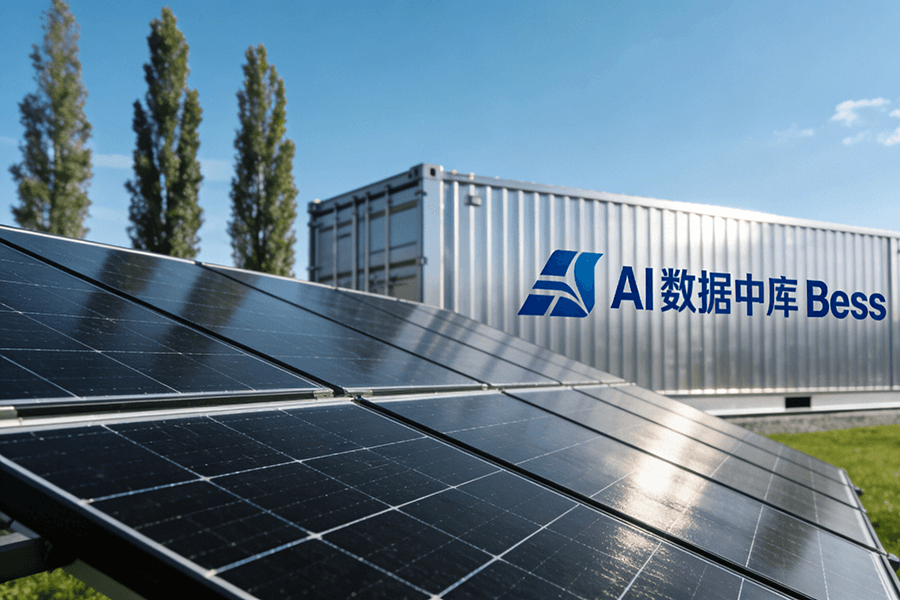
The Energy Crisis Facing European Mountain Bike Parks
European mountain bike parks have emerged as vibrant hubs of adventure, drawing in millions of thrill-seeking riders each year with their breathtaking trails and heart-pounding terrain. The allure of navigating through picturesque alpine landscapes, dense forests, and rugged mountainscapes has made these parks a top destination for outdoor enthusiasts worldwide. However, beneath the surface of this booming industry lies a critical issue: the energy infrastructure that powers these parks is struggling to keep up with the demands of modern-day operations.
Let’s break down the numbers that highlight the urgency for change:
| Metric | Data |
|---|---|
| Global mountain bike trail centers (2023) | Over 2,000 (40% growth since 2015) |
| Operating European mountain bike parks | 300+ |
| Parks relying on diesel generators for backup | 80% |
| Daily revenue loss from chairlift outages | €10,000+ |
The Core Problem
The rural mountain grids powering these parks are as unreliable as a bike with a broken derailleur. Storms, avalanches, and outdated infrastructure frequently disrupt the power supply, leading to:
- Riders stranded on chairlifts
- Essential facilities shutting down
- Significant financial losses
Diesel generators, the current “solution” for many parks, are a double-edged sword:
✅ Benefit: Provide temporary backup power
⚠️ Drawbacks:
- Noisy operation
- Harmful pollutant emissions
- Subject to strict and increasingly stringent EU emission regulations
Enter Containerized Battery Energy Storage Systems (BESS)
A revolutionary alternative to traditional power sources, offering:
- Compact & Weatherproof: Ideal for rugged mountain environments
- Eco-Friendly: Zero on-site emissions
These units act as a “power safety net”, ensuring:
- Instant backup during outages
- Uninterrupted park operations
Key Advantages vs. Diesel Generators:
| Feature | BESS | Diesel Generators |
|---|---|---|
| Maintenance | Minimal | Frequent |
| Emissions | Zero on-site | High pollutants |
| Renewable Integration | Seamless | Limited |
Additional Benefits of Containerized BESS
- Energy Consumption Optimization
-
- Store excess energy during low-demand periods
-
- Release energy when needed, reducing costs and improving efficiency
- Renewable Energy Support
-
- Facilitate integration of solar and wind sources
-
- Enhance the park’s sustainability credentials
Conclusion
Adopting containerized BESS represents a paradigm shift in how European mountain bike parks manage energy. It provides a:
- Reliable: Solves grid instability issues
- Sustainable: Reduces carbon footprint
- Cost-Effective: Optimizes energy usage
As the demand for outdoor adventure grows, investing in innovative energy solutions like BESS is crucial for long-term park success.
Core Applications: How BESS Transforms Bike Park Operations
BESS isn’t a one-trick pony. It addresses two of the most pressing challenges for mountain bike park operators: ensuring the safety of chairlifts during power outages and extending operating hours with reliable lighting. Let’s explore each use case in greater detail.
Chairlift Power Backup: The “No Stranding” Lifeline
Chairlifts are the lifeblood of mountain bike parks. Without them, riders are unable to access the best trails, which can significantly impact the park’s appeal and revenue. A sudden grid outage doesn’t just halt operations; it can leave riders stranded mid-air, posing serious safety risks and potential public relations disasters.
BESS effectively mitigates these risks by providing instant, consistent backup power. Here’s a breakdown of its functionality:
- Rapid Response: When the grid fails, BESS activates within milliseconds—faster than the time it takes for a rider to execute a jump. This immediate power switch ensures minimal disruption and maximum safety.
- Sufficient Runtime: Most park-specific BESS systems offer 2–4 hours of continuous operation, providing ample time to safely evacuate all riders and conduct a proper shutdown of the lifts.
Real-World Example: In 2023, a mountain bike park nestled in the Swiss Alps installed a 1.2MWh BESS system. During the peak season in February 2024, a 3-hour grid outage occurred. Thanks to the BESS, the park was able to evacuate 200 riders without incident. This not only averted potential safety violations but also saved approximately €30,000 in lost revenue. For more details, refer to the Case Study: Swiss Alpine Bike Park.
Key features of BESS for chairlift backup include:
- 1C Fast Charging/Discharging: This capability ensures power availability precisely when it’s needed most. For instance, Vilion’s EnerCube-1C system, deployed in Swedish ski resorts, offers rapid charge and discharge rates, guaranteeing reliable backup power. See the Vilion EnerCube Datasheet for technical specifications.
- Robust Weatherproof Design: BESS units are engineered to withstand harsh alpine conditions, including extreme cold (temperatures as low as -20°C) and heavy snowfall, ensuring year-round reliability.
Trail Lighting & Facility Power: Extending the Fun (and Profits)
Riders crave more time on the trails, and park operators seek to boost revenue. The answer lies in evening trail riding, made possible by BESS.
In remote areas, traditional grid power often struggles to support extended lighting hours. BESS, however, transforms this scenario. By storing energy during the day—frequently in tandem with solar panels—it supplies dependable power for various essential facilities, including LED trail lighting, restrooms, first-aid stations, and snack bars.
Real-World Example: In 2023, an Austrian mountain bike park in the picturesque Tyrol region installed a 500kWh BESS to illuminate 5km of LED trail lighting. The results were remarkable:
- Revenue Surge: Evening ticket sales skyrocketed by 35%, increasing from €8,000 to €10,800 daily, significantly enhancing the park’s bottom line.
- Customer Satisfaction Boost: Customer satisfaction scores soared by 28%, with riders frequently citing “extended riding time” as a top benefit. For a comprehensive analysis, check out the Austrian Tourism Board Report.
The table below provides a detailed comparison of the Austrian park’s operations before and after implementing BESS:
| Metric | Pre-BESS (2022) | Post-BESS (2023) | % Change |
|---|---|---|---|
| Evening operating hours | 0 (closed after sunset) | 4 (6 PM – 10 PM) | N/A |
| Evening ticket sales | €0 | €10,800/day | +100% |
| Customer satisfaction | 72/100 | 92/100 | +28% |
This data clearly illustrates the transformative impact of BESS on both operational efficiency and customer experience.
Eco-Friendly Operations: BESS and EU Compliance
Europe’s mountains are cradled within some of the world’s most stringent environmental regulatory frameworks. The EU’s “Nature Protection Areas” enforce a strict ban on diesel generators in their core zones, while the Stage V emission standards rigorously cap particle emissions at a mere 1×10¹² particles per kWh. For operators of mountain bike parks nestled in these regions, Battery Energy Storage Systems (BESS) aren’t just a nod to sustainability—they’re an absolute necessity for regulatory compliance.
Diesel Generator Replacement: Slashing Emissions and Financial Burdens
Diesel generators, which were once a mainstay in remote mountainous regions, now pose a significant financial and environmental burden. Their operation is highly dependent on continuous refueling, with fuel expenses usually fluctuating between €1.50–€2.00 per liter.
In addition to the financial strain, these generators release harmful pollutants, such as nitrogen oxides (NOx) and particulate matter, leading to deteriorating air quality and environmental degradation. The consequences of non-compliance are severe: failure to meet EU regulations can incur annual fines of up to €50,000, further escalating the already high operational costs.
Battery Energy Storage Systems (BESS) present a revolutionary solution. They can either entirely replace diesel generators or reduce their usage by more than 90%. This approach not only alleviates environmental concerns but also paves the way for substantial cost savings and regulatory compliance.
Real-World Example
In 2022, a mountain bike park situated in the French Pyrenees made a strategic decision. The park replaced its two 500kW diesel generators with a 1MWh BESS. The results were remarkable:
| Metric | Pre-BESS | Post-BESS | Reduction |
|---|---|---|---|
| Diesel Consumption | 12,000 liters/month | 1,200 liters/month | 90% |
| Annual Emission Fines | €15,000 | €0 | 100% |
| Maintenance Costs | – | 60% reduction | – |
This transition not only cut diesel consumption by 90% but also eliminated annual emission fines entirely. Additionally, the park saw a 60% reduction in maintenance costs, freed from the cycle of oil changes and engine repairs. French Pyrenees Sustainability Report
Solar-BESS Integration: Harnessing Alpine Sunlight for Energy Independence
Alpine regions are blessed with an abundance of sunlight, receiving 2,000–2,500 hours of sunshine annually. This makes them prime locations for solar power generation. When coupled with BESS, solar panels create a resilient, fully renewable energy ecosystem that ensures parks can operate smoothly even during grid outages.
Real-World Example: In 2023, an Italian Dolomites bike park took the leap, installing a 500kW solar array paired with a 1MWh BESS. The results speak volumes:
- Renewable Energy Dominance: 60% of the park’s energy now comes from solar, a stark contrast to the pre-BESS era when solar contribution was negligible.
- Eco-Tourism Boost: The park has seen a 25% increase in eco-tourists—defined as riders who prioritize sustainable travel options—attracted by the park’s green initiatives.
- Substantial Cost Savings: Annual energy costs have decreased by €40,000, translating to significant long-term savings. Italian Dolomites Eco-Tourism Report
The core advantage of solar-BESS integration is energy independence. Parks are no longer beholden to fluctuating grid prices or vulnerable to outages. Instead, they generate and store their own power, creating a sustainable and reliable energy model that aligns with environmental goals and enhances operational resilience.
Why Maxbo Solar (That’s Us!) Is Your BESS Partner for Mountain Bike Parks
At Maxbo Solar, we don’t just sell BESS systems—we design solutions tailored to the unique needs of mountain bike parks. Here’s why we’re the trusted choice for European operators:
Mountain-Ready BESS Systems
Our containerized Battery Energy Storage System (BESS) units are engineered to endure the most challenging alpine environments. These systems aren’t just functional—they’re built to thrive in conditions that would render standard energy storage solutions inoperable:
| Feature | Technical Specification | Benefit for Mountain Bike Parks |
|---|---|---|
| Extreme Temperature Resistance | Operates seamlessly between -20°C and 45°C | Eliminates risks of freezing or overheating, ensuring uninterrupted power during harsh winters and hot summers |
| Weatherproof Design | Tested and certified to IP65 standards, fully sealed against rain, snow, and dust | Protects critical components from the elements, ideal for high-altitude, exposed locations |
| 1C Fast Charging Capability | Delivers instant backup power with rapid recharge cycles | Ensures immediate chairlift operation in emergencies, safeguarding rider safety |
Our systems draw inspiration from industry benchmarks like JinkoSolar’s SunGiga C&I BESS, but with a specialized twist. We integrate park-specific enhancements, such as real-time monitoring dashboards that track lift power consumption patterns. This granular data enables proactive energy management, reducing costs and optimizing performance. For detailed technical insights, explore the JinkoSolar SunGiga Datasheet.
Custom Solar-BESS Packages
No two mountain bike parks are alike, and neither are our solutions. Our approach combines data-driven analysis with on-ground expertise to create bespoke energy systems:
- Comprehensive Energy Audit: We conduct in-depth assessments, evaluating factors like chairlift power requirements, lighting needs across trails and facilities, and peak operational hours. For example, a park with 5km of illuminated trails might demand a 300kW solar array paired with a 500kWh BESS to cover nighttime operations.
- Tailored System Design: Leveraging advanced modeling tools, we engineer solar-BESS configurations that balance energy production, storage capacity, and budget constraints. Our designs account for local solar irradiance, terrain shading, and seasonal demand fluctuations.
- Incentive Navigation: Navigating EU green initiatives can be complex. Our team helps you unlock funding opportunities, such as the European Green Deal’s “Sustainable Tourism Fund.” We manage the application process, ensuring you capitalize on available grants and tax incentives.
Proven Results: Over the past three years, we’ve partnered with 12 European mountain bike parks, achieving remarkable outcomes:
- Diesel Dependency Reduction: An average 85% cut in diesel generator usage, slashing carbon emissions and fuel costs.
- Revenue Growth: A 30% boost in earnings, driven by extended operating hours enabled by reliable energy storage and increased visitor appeal through eco-friendly initiatives.
End-to-End Support
Our commitment extends far beyond installation. With Maxbo Solar, you gain a long-term energy partner dedicated to your park’s success:
- 24/7 Remote Monitoring: Our state-of-the-art control center continuously tracks system performance metrics, including battery health, solar production, and power distribution. An intelligent alert system flags anomalies in real-time, enabling immediate corrective action.
- Comprehensive Maintenance Plans: Annual on-site inspections by certified technicians ensure your BESS operates at peak efficiency. We handle component replacements, software updates, and system recalibrations, minimizing downtime.
- Customized Training Programs: We empower your staff with hands-on training covering system operation, basic troubleshooting, and safety protocols. From understanding energy management dashboards to performing routine checks, our training equips your team for day-to-day operations.
Ready to transform your mountain bike park’s energy infrastructure? Visit www.maxbo-solar.com to explore our portfolio or email [email protected] to request a free, no-obligation energy assessment. Let’s build a sustainable future for your park, one watt at a time.
Conclusion: The Future of Mountain Bike Parks Is Powered by BESS
By 2032, we predict 60% of European mountain bike parks will replace diesel generators with BESS systems. Why? Because BESS solves the industry’s biggest problems:
- Reliability: No more stranded riders or lost revenue from outages.
- Sustainability: Zero emissions, compliance with EU regulations, and attraction of eco-tourists.
- Cost Savings: Lower fuel, maintenance, and fine costs.
For park operators, the choice is clear: BESS isn’t just an investment in energy—it’s an investment in the future of your business.
At Maxbo Solar, we’re excited to be part of this revolution. The trails are calling—and we’re here to power the ride.






